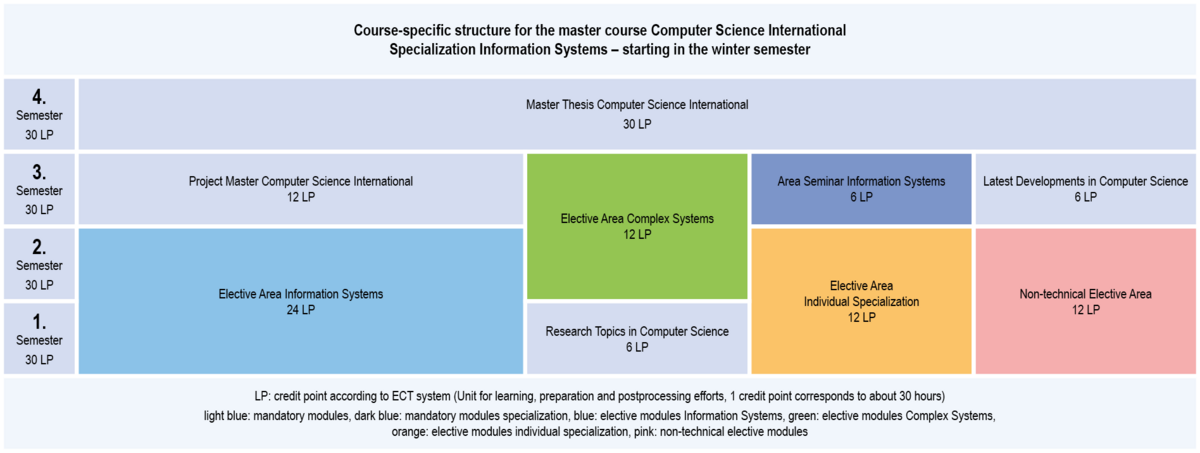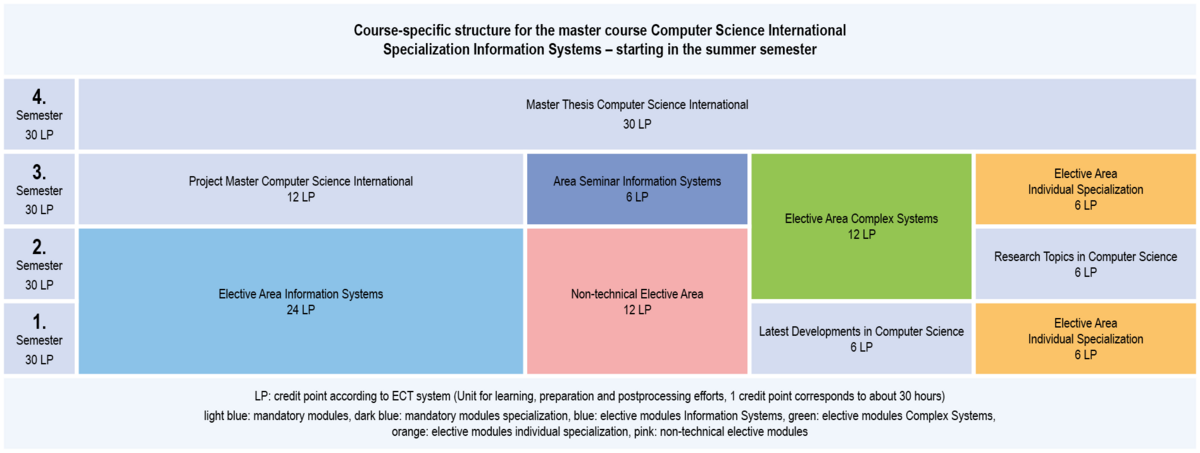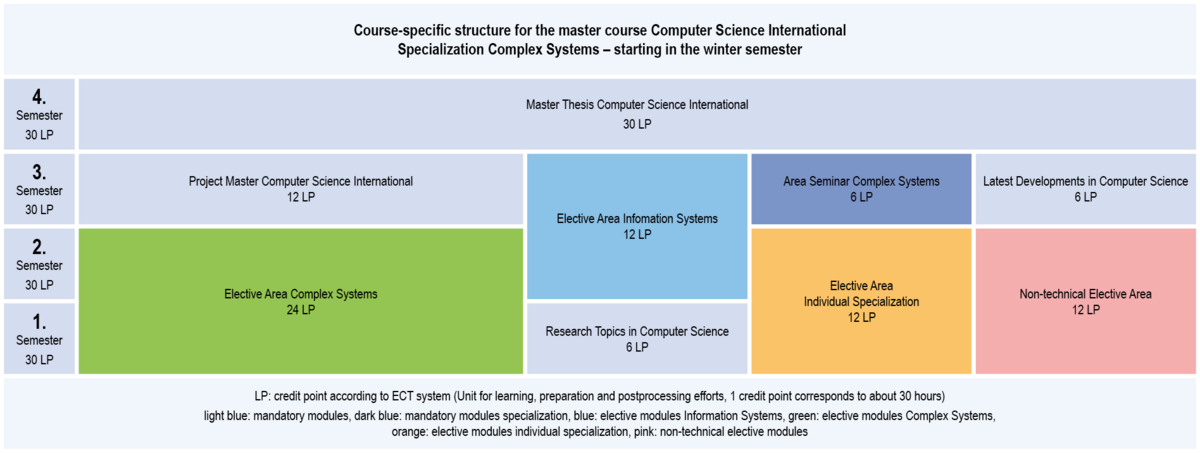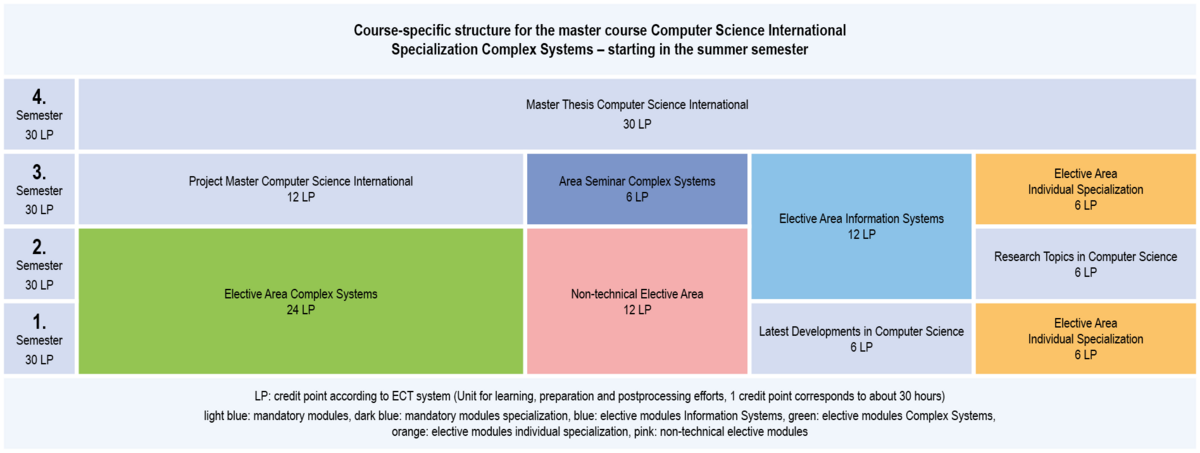With the research-oriented master‘s program in Computer Science International, you qualify for academic and industrial fields of computer science, for specialist activities in the public sector and for taking up doctoral studies at a national or international university. You deepen and expand your scientific knowledge and skills acquired in the bachelor‘s program. You will be prepared for assuming responsibility both in business and for the further development of science in research. Because computer scientists are urgently sought worldwide, all development opportunities are open to you.
You are interested in further qualifying and specializing in the field of computer science. In addition to having a bachelor's degree with good results and good knowledge of English, you have the skills to grasp complex tasks and apply your theoretical knowledge to solve them. A good level of abstraction is also helpful.
In the Master‘s program in Computer Science International, you expand and deepen your specialist knowledge in one of the two specializations „Information Systems“ or „Complex Systems“. In the first three semesters you will take the modules of the chosen specialization, selected modules from the other specialization and two non-technical modules. The non-technical elective primarily serves the acquisition or improvement of language skills in German and English as well as the acquisition of soft skills. The non-technical modules taken are intended to improve linguistic, non-technical and social skills as well as the students‘ self-competence. Possible subject areas include founding a company, time management, mentoring, management tasks, presentation techniques, social impact of computer science or didactics of computer science. In the third semester you will carry out project work. In the fourth semester, you create and defend your master‘s thesis.
The master's program in Computer Science International comprises four semesters. The first three semesters expand the theoretical basics and allow you to deepen your choice of specializations. The Master's thesis is written in the fourth semester.
The master's program in Computer Science International can be studied in one of the two following specializations
- Information Systems or
- Complex Systems
The study office must be informed in writing of the decision for one of the majors when registering for the master's thesis. It is only possible to change an earlier advertisement up to this point.
In the Information Systems specialization, the focus is on the design of software, algorithms and data structures for information systems, techniques for the efficient analysis of large amounts of data and related topics. The specialization includes topics from the area of databases such as the administration, retrieval and analysis of large amounts of data, as well as modern big data processes and data mining, which combine complex models and large databases and analyze them together. Furthermore, the traceability of processes and results as well as the protection of privacy are discussed. This specialization also includes topics in software engineering, such as user-oriented design, human computer interfaces and software development methods, as well as the basics of machine learning (or more generally artificial intelligence), interactive visual analysis and the development and use of simulation models. Students learn to use relevant techniques, methods and procedures appropriately, to analyze, to develop and to assess their impact on society.
The Complex Systems specialization deals with architectures, models, methods, algorithms and tools for IT systems, which due to their size and complexity require a systematic approach to design, implementation and operation, as well as related topics. The complexity of these systems results from the distribution and the multitude of interacting components as well as from their heterogeneity and their diverse interdependencies. The specialization includes topics from the areas of modeling, analysis and simulation techniques for the design and evaluation of complex systems as well as verification techniques for the proof of important system properties (such as correctness). To ensure that the respective systems work efficiently, securely and reliably, the specialization also deals with methods of self-organization, security and fault tolerance mechanisms, cryptographic and distributed algorithms as well as technologies in the areas of middleware and the World Wide Web. Students learn to use relevant techniques, methods and procedures appropriately, to analyze, to further develop them and to assess their effects on society.
The course is offered in English. It is suitable for English speaking international students. It is also suitable for German-speaking students with very good knowledge of English who pursue an international career and in addition to the acquisition and apply of advanced skills of English language.
The level of expertise and academic qualifications of Master of Science comply with the internationally and in Germany well known degree "Diplomingenieur". The various choices in the areas of specialization offered ensure both the scientific depth as well as the relevance of the study for industrial practice. Successful completion of this course of study entitles you to use the protected professional title of “engineer” in accordance with the Architectural and Engineering Law of the State of Mecklenburg-Western Pomerania.
The Faculty of Computer Science and Electrical Engineering ensures excellent care because of very good student-professor ratio. Further advantages are the proximity to the library, to student dormitories and to the cafeteria.
Individual part-time studies possible: Students who can only spend about half of the time budget for the study work because of a job or because of family obligations, have the opportunity to apply for the study form Individual part-time studies (Individuelles Teilzeitstudium) twice each for two semesters. Of the two semesters then only one semester will be counted to the standard period of study.
Typical occupational fields are academic research and teaching, research, development, project planning, sales, commissioning and service departments of industrial companies in computer science or IT-related departments in companies in other industries, as well as research, development and consulting departments of research institutions, authorities and associations.
Admission requirements:
- Mother tongue English or proof of sufficient English language skills (proof not older than two years): TOEFL IBT with at least 94 points or IELTS with at least 7,0 points (the certificate should not be older as two years)
- first academic degree in Computer Science with at least 180 credit points or another equivalent qualification; with with at least 85 % of the CGPA (Cumula- tive Grade Point Average) or a comparable grade
- proof of profound knowledge: Mathematics (at least 18 credit points), Theoretical Computer Science, in particu- lar Computability, Complexity, Formal Languages, Formal Semantics and Formal Modeling (at least 12 credit points). A maximum of 9 credit points in Theoretical Computer Science can be made up in the first year.
This degree program is not restricted to admission (no numerus clausus).
Prospective students from the University of Rostock
An application is not required.
Enrollment takes place online in the registration portal of the University of Rostock:
- from August 1st to September 30th for the next winter semester or
- from February 1st to March 31st for the next summer semester
further information:
- enrollment for masters courses (including description form) (Uni-Web)
Prospective students from Germany
An application is not required.
Enrollment is online in the enrollment portal of the University of Rostock:
- from the 1st of August to the 30st of September for the next winter semester or
- from the 1st of February to the 31st of March for the next summer semester
further information:
- enrollment for masters courses (Uni-Web)
International prospective students must be in the period
- from the 1st of April to the 31th of May for the next winter semester or
- from the 1st of October to the 30th of November for the next summer semester
apply online at UniAssist and then enroll in the degree program at the University of Rostock upon receipt of the admission letter. More information can be found on the Website of the University of Rostock below.
further information:
- Application for the study courses of the faculty of Computational Science and Electrical Engineering via Uni Assist
- master courses for international students
- full-time degree program information for non-German prospective students
Application: application via Uni-Assist, see www.uni-assist.de
Further information can be found here:
Broschures
► Flyer (pdf) (english)
► Flyer (pdf) (deutsch)
Framework Examination Regulations (RPO)
The general rules of study in Bachelor's and Master's degree programs at the University of Rostock are determined by the
► Framework Examination Regulations (Bachelor/Master) in the currently valid version.
Specific Examination and study Regulations
The detailed rules for the study of a specific study program, are then regulated in the respective program-specific examination and study regulations (SPSO). When entering a higher subject semester, older versions of the SPSO may apply (see history).
M.Sc. Computer Science International
aktuell gültig für Neuimmatrikulationen zum 1. Fachsemester:
► Neufassung (2025)
► Neufassung (2019)
► 1. Änderungssatzung (2021) → Nicht amtliche Lesefassung
→ Nicht amtliche englische Lesefassung
University of Rostock
Faculty of Computer Science and Electrical Engineering
Departmental student advisory service of the faculty
Prof. Dr.-Ing. Gero Mühl
fon: +49 (0)381 - 498 7630
gero.muehl(at)uni-rostock.de
Address:
Albert-Einstein-Straße 22 (Konrad-Zuse-Haus) | 18059 Rostock | GERMANY
consultation hours after arrangement
Study Office and Examination Office Computer Science International
Anita Björk-Pagel
Tel.: +49 (0)381 - 498 7004
csi.ief(at)uni-rostock.de
Address:
Albert-Einstein-Straße 26 | 18059 Rostock | GERMANY
Room 006
consultation hours after arrangement
More information at the faculty website:
Student Service Center (SSC) of the University of Rostock
Info service in the SSC: Central contact point for prospective students and students
The Student Service Center brings together all the important information and advice offered by various institutions for prospective students and students. Those seeking advice should first contact the info service. If necessary, referrals are made here or an individual consultation appointment is arranged.
Parkstraße 6, 18057 Rostock, GERMANY, room / Raum 024
fon: +49 (0)381 - 498 1230
studium(at)uni-rostock.de
contact and office gours: Student Service Center (SSC) of the University of Rostock – Homepage





